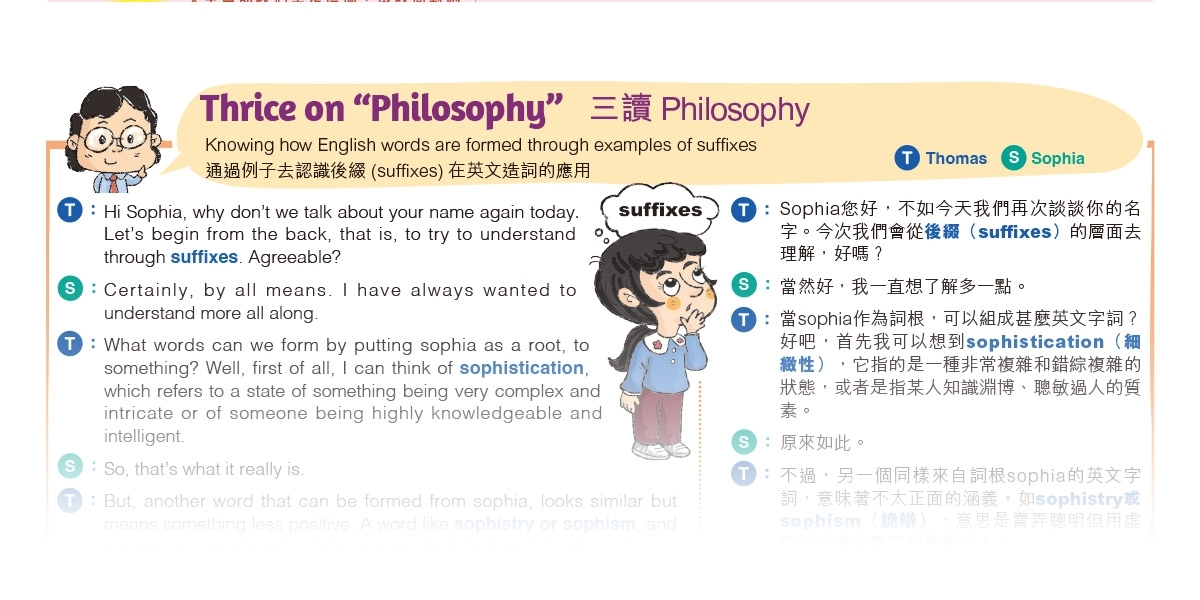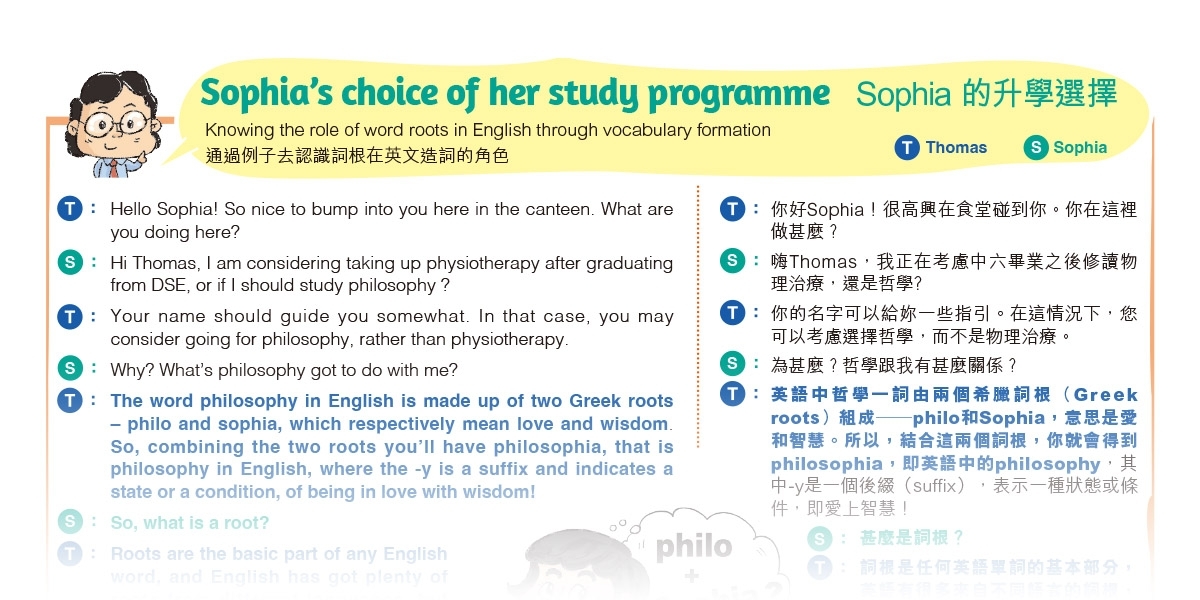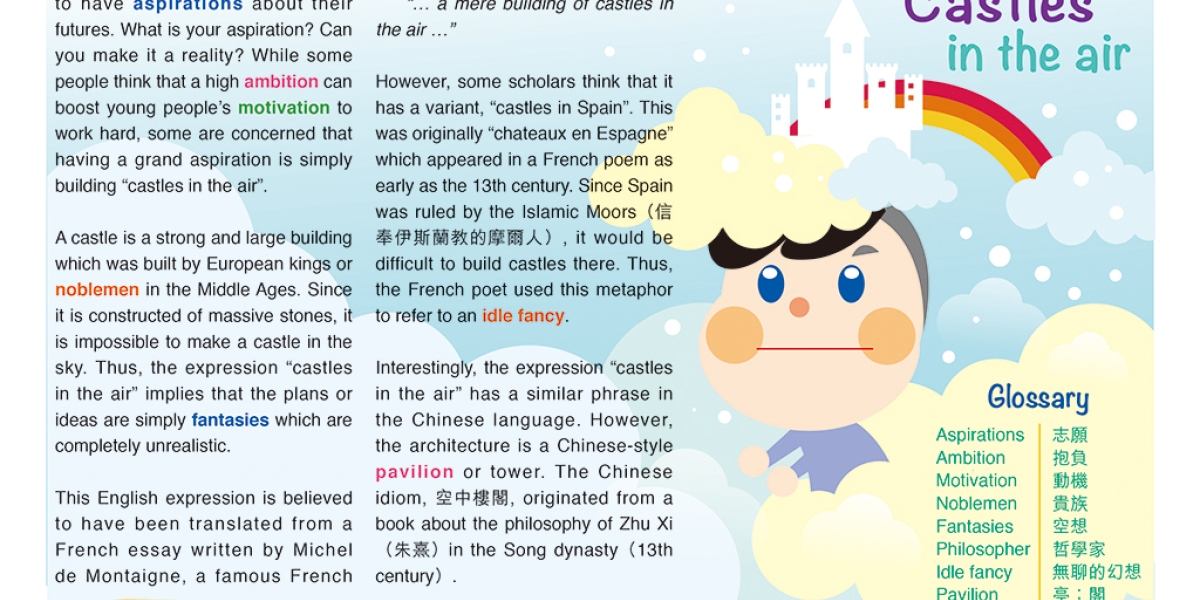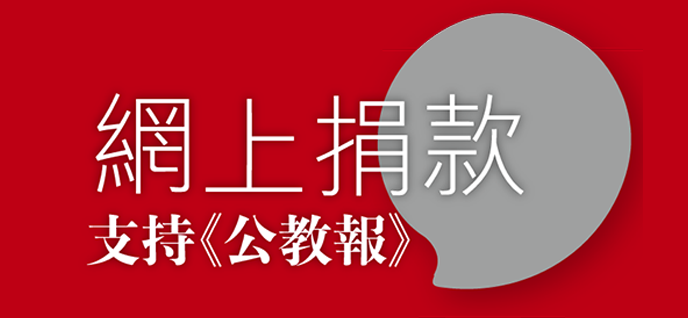昔日文章


Learning English with Thomas
2023.04.16
Thriceon“Philosophy”
三讀Philosophy
Knowing how English words are formed through examples of suffixes
通過例子去認識後綴 (suffixes) 在英文造詞的應用
T: Thomas, S: Sophia
T: Hi Sophia, why don’t we talk about your name again today. Let’s begin from the back, that is, to try to understand through suffixes. Agreeable?
S: Certainly, by all means. I have always wanted to understand more all along.
T: What words can we form by putting sophia as a root, to something? Well, first of all, I can think of sophistication, which refers to a state of something being very complex and intricate or of someone being highly knowledgeable and intelligent.
S: So, that’s what it really is.
T: But, another word that can be formed from sophia, looks similar but means something less positive. A word like sophistry or sophism, and it means to use clever but false arguments to fool and cheat people.
S: Oh, I don’t like the way they treated people.
T: Of course not. They are derived from the root sophia plus suffixes like−istry and−ists and−istication, and so on.S: Thanks Thomas Sir. You have taught me a lot. Can I buy you coffee?
T: Oh, that’s very gracious of you. I’d rather have tea, can I?
T: Sophia您好,不如今天我們再次談談你的名字。今次我們會從後綴(suffixes)的層面去理解,好嗎?
S: 當然好,我一直想了解多一點。
T: 當sophia作為詞根,可以組成甚麼英文字詞? 好吧,首先我可以想到sophistication(細緻性),它指的是一種非常複雜和錯綜複雜的狀態,或者是指某人知識淵博、聰敏過人的質素。
S: 原來如此。
T: 不過,另一個同樣來自詞根sophia的英文字詞,意味著不太正面的涵義。如sophistry或 sophism(詭辯),意思是賣弄聰明但用虛假的論據來愚弄和欺騙他人。
S: 噢,我不喜歡他們這樣待人。
T: 當然不能那樣。這些字詞組成都是從詞根 sophia加上不同的後綴而來,如-istry和-ists 和-istication等等。
S: 謝謝Thomas老師。你教懂了我很多。我可以請你喝咖啡嗎?
T: 噢,你太客氣了。我寧願喝茶,可以嗎?


Learning English with Thomas
2023.04.02
Revisiting the word “Philosophy”
再談 Philosophy
Knowing how English words are formed through examples of prefixes
通過例子去認識前綴(prefixes)在英文造詞之作用
T: Thomas, S: Sophia
T: Hi Sophia, what is your subject for today’s discussion?
S: Last time through how my name is formed you helped me know more deeply about word roots. Thanks so much. Can I ask a bit more about how prefixes and suffixes function?
T: What are prefixes and suffixes? Parts of words that you find either at the beginning or at the end of the word. But these can’t stand alone, and most roots aren’t able to stand alone either.
S: Can you give me some more examples? Now I only know how the word philosophy is formed, by putting two Greek roots together, like this, philo plus sophia, right?
T: Correct. Let’s have a couple of prefixes related to the roots making up the word philosophy. We may start with the root philo or phil first. Now, we can put phil and anthropo together and we’ll have philanthrophy, which means love of mankind。
S: Ah, I see. What else?
T: Well, we can have philharmonic, like Hong Kong Philharmonic Orchestra, which means love of harmony in music.
S: So philharmonic means that!
T: Yes, and there are more. Like the name Philip, which means love of horses, since phil means love and hippos means horses.
T: Hi Sophia, 今天你有甚麼課題,想一起討論﹖
S: 上次你通過我的英文名(Sophia),加深了我對詞根(roots)的認識,十分感謝你。今天,我可以了解多一點前綴及後綴的運用嗎﹖
T: 甚麼是前綴和後綴?英文單詞的開頭部分,就是前綴;單詞部分的結尾,就是後綴。不論前綴或後綴, 都是不能單獨存在,而且大多數詞根也不能單獨存在。
S: 你能給我一些例子嗎? 現在我只知道英文字哲學(Philosophy)是怎麼形成的,就是把兩個希臘詞根放在一起,像這樣,philo加sophia,對吧?
T: 對。讓我們談談一些與構成哲學這個詞的詞根相關的前綴。我們可以先看看詞根philo或phil。現在, 我們可以把phil和anthropo放在一起,我們就有了philanthrophy(慈善),意思是對人類的愛。
S: 啊,我明白了。還有甚麼?
T: 好吧,我們可以構成「管弦樂團」(philharmonic), 像香港管弦樂團( Hong Kong Philharmonic Orchestra),意味著熱愛音樂和諧。
S: 這就是 philharmonic 的意思!
T: 是的,還有更多。就像Philip這個名字,意思是對馬兒的鍾愛,因為phi的意思是愛,而hippos的意思是馬。


Learning English with Thomas
2023.03.24
Sophia’s choice of her study programme
Sophia 的升學選擇
Knowing the role of word roots in English through vocabulary formation
通過例子去認識詞根在英文造詞的角色
S : Sophia
T: Thomas
T: Hello Sophia! So nice to bump into you here in the canteen. What are you doing here?
S: Hi Thomas, I am considering taking up physiotherapy after graduating from DSE, or if I should study philosophy ?
T: Your name should guide you somewhat. In that case, you may consider going for philosophy, rather than physiotherapy.
S: Why? What’s philosophy got to do with me?
T: The word philosophy in English is made up of two Greek roots – philo and sophia, which respectively mean love and wisdom. So, combining the two roots you’ll have philosophia, that is philosophy in English, where the -y is a suffix and indicates a state or a condition, of being in love with wisdom!
S: So, what is a root?
T: Roots are the basic part of any English word, and English has got plenty of roots from different languages, but mostly from Latin and Greek.
By the way, you know, getting to know quite a few such roots will take you a long way towards expanding your English vocab.
T: 好Sophia!很高興在食堂碰到你。你在這裡做甚麼?
S: 嗨Thomas,我正在考慮中六畢業之後修讀物理治療,還是哲學﹖
T: 你的名字可以給妳一些指引。在這情況下,您可以考慮選擇哲學,而不是物理治療。
S: 為甚麼?哲學跟我有甚麼關係?
T: 英語中哲學一詞由兩個希臘詞根(Greek roots)組成——philo和Sophia,意思是愛和智慧。所以,結合這兩個詞根,你就會得到 philosophia,即英語中的philosophy,其中-y是一個後綴(suffix),表示一種狀態或條件,即愛上智慧!
S: 甚麼是詞根?
T: 詞根是任何英語單詞的基本部分, 英語有很多來自不同語言的詞根, 但主要來自拉丁語和希臘語。順帶一提,你要知道,多了解這些詞根會對你在擴展英語詞彙方面大有幫助。


Stories behind famous saysings
2018.05.18
Castles in the air
Young people are always encouraged to have aspirations about their futures. What is your aspiration? Can you make it a reality? While some people think that a high ambition can boost young people’s motivation to work hard, some are concerned that having a grand aspiration is simply building “castles in the air”.
A castle is a strong and large building which was built by European kings or noblemen in the Middle Ages. Since it is constructed of massive stones, it is impossible to make a castle in the sky. Thus, the expression “castles in the air” implies that the plans or ideas are simply fantasies which are completely unrealistic.
This English expression is believed to have been translated from a French essay written by Michel de Montaigne, a famous French philosopher, in the 16th century.
“… a mere building of castles in the air …”
However, some scholars think that it has a variant, “castles in Spain”. This was originally “chateaux en Espagne” which appeared in a French poem as early as the 13th century. Since Spain was ruled by the Islamic Moors(信奉伊斯蘭教的摩爾人), it would be difficult to build castles there. Thus, the French poet used this metaphor to refer to an idle fancy.
Interestingly, the expression “castles in the air” has a similar phrase in the Chinese language. However, the architecture is a Chinese-style pavilion or tower. The Chinese idiom, 空中樓閣, originated from a book about the philosophy of Zhu Xi (朱熹)in the Song dynasty(13th century).
Glossary
Aspirations
志願
Ambition
抱負
Motivation
動機
Noblemen
貴族
Fantasies
空想
Philosopher
哲學家
Idle fancy
無聊的幻想
Pavilion
亭;閣






